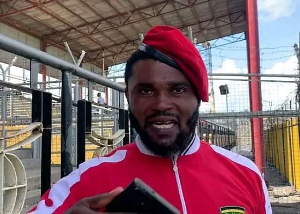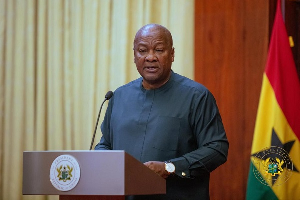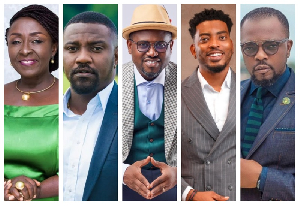The Governing Council of the University of Energy and Natural Resources (UENR) Tuesday appealed to government to provide some GHC 50 million for the institution's infrastructural development.
According to the Council, the University that was started in 2012 with a student population of 154, now has an urgent need to expand its existing facilities to contain the growing population which currently stands at 6,000 students.
Professor A. K. Tuah, Chairman of the UENR Council, who made the request when the body called on President Nana Addo Dankwa Akufo-Addo at the Jubilee House in Accra, said an urgent infrastructural boost was needed to enhance teaching and learning at the University.
He recounted how during the establishment of the UENR, by Act 830 in 2011, the institution initially provided seed money of GHC 10 million that was utilized for the payment of salaries, the rehabilitation of a few buildings, the acquisition of a few vehicles and some recurrent expenditure.
"We were to benefit from a $20 million loan with the University of Health and Allied Sciences... eventually, we did not receive a cent from the $20 million loan", he said.
Prof Harrison Dapaah, the Vice Chancellor of the University, said the mandate of the UENR was to train people to solve the problem of energy and natural resources problems.
He said with the increased number that have been envisaged to enroll in the university as a result of the Free Senior High School policy, the institution was positioning itself with engineering as a catalyst for the Ghana Beyond Aid vision, and want to increase the engineering student population by 25 percent.
On the National Innovation and Entrepreneurship Programme, the University, Prof Dapaah said, has been awarded the contract too train about 5,000 youth.
He said the institution has partnered the German government and the British Council to train some 500 artisans some of whom would soon establish their businesses. This is expected to stem the tide of youth migration from Ghana to Europe.
The Vice Chancellor also spoke of the several projects that the University was engaged in with the little resources and infrastructure at their disposal such as a weather prediction system, earth observation and innovation center, fire detecting equipment capable of detecting wild fires from Senegal to Cameroon.
He said the school has a programme with the Kennedy Space Centre in Florida of USA and collaborated to launch the satellite which would help the school to be able to have one of the first-class weathers determining equipment in the country.
He said the weather prediction from the equipment was so apt that a number of radio stations relied on the information from the Earth Observation and Innovation Centre which hosts the satellite.
The Vice-Chancellor said the University, with the equipment, can detect wild fires as far away as Senegal and Cameroun and the whole of the West Africa region; adding that the university has recently partnered the Ghana Fire Service to look at how these could be used to detect household fires.
He said the University has also partnered the Chinese government to support seven tertiary institutions with solar energy and had also offered the facility to other government institutions as well as communities that were not on the national grid.
Though the UENR had done extremely well with its meagre resources, Prof Dapaah expressed confidence that with more support the institution would be able to help the government to attain the Ghana Beyond Aid vision and called for support to get more lecture theatres, laboratory and equipment.
"We humbly want to appeal to Mr President that in terms of the infrastructure, laboratory, farm infrastructure and equipment, if a seed money of 50 million cedis could be granted us that would help us to be able to establish some of these equipment and laboratories that we are in need of", he said.
President Akufo-Addo, who inspired by the school's story, said the government would give the university a positive response.
Noting the critical significance of the work the University was doing in the spheres of energy and natural resource, which would boost Ghana's fledgling oil and gas industry, the President said there was the utmost need to support the school to train the human resource needed for the development of the sector and the country as a whole.
He congratulated the Council for the institution's achievements with the limited budget and resources at their disposal, especially starting with 150 students and currently with a student population of 6,000.
The President assured them that government would pay urgent heed to their request for budgetary support, saying, "There could be no investment better than the investment in educational system".
“We have no option. We are already spending a lot of the money of the country on education. We are doing so advisedly because all of us know that countries are developed by human beings and not by raw materials or natural resources so the sooner, we equip our population with the necessary skills the better change we have to deal with the development deficit.
General News of Wednesday, 3 July 2019
Source: GNA

















